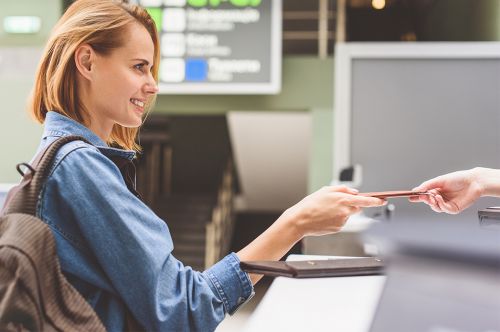If you’re here, you’ve probably been searching for information about what to expect at an interview with a USCIS immigration officer or U.S. consular officer abroad. Perhaps you’ve spoken with some friends or family who have been through it to get an idea about things. Maybe you’re going in completely unaware of what to expect. Whatever you have or haven’t heard, wherever you are in the world, and regardless of what type of case you are being interviewed for, interviews follow a similar pattern. Here are some tips to help you at this crucial stage in your journey.
Breathe
Try not to stress...too much. Some nerves are normal. As long as your case is genuine, you have nothing to worry about. Sleep well the night before. Drink plenty of water and have a healthy meal or snack before you go. Expect to be at the USCIS office or consulate for about two hours. Generally, an interview at a USCIS field office will take approximately 25 to 30 minutes. A visa interview at a U.S consulate or embassy abroad is often conducted in far less than 10 minutes, especially non-immigrant visa applications such as a tourist visa. In both venues, you will spend more time waiting for your interview to start than experiencing the actual interview itself.
Embrace the silence
For whatever reason, many of us aren't comfortable with silence. Try to embrace the silent moments. Don’t fill in the quiet moments with words. It is normal for an immigration officer to look down at your file or look at their computer without talking. Your officer may even leave the room or cubicle for a short while. This is normal. Don't panic.
Do not ramble
Rambling can be annoying for the person on the receiving end of the ramble, but it’s also an indicator that the person rambling is nervous. Some nerves are normal and expected, but be careful not to give the false impression that you are trying to hide something, cover something up or even diverting the officer’s attention. Honest people sometimes ramble. Dishonest people sometimes ramble too. It may just be in your nature to ramble, but the officer doesn’t know that. Answer questions in concise sentences. Do not over indulge with words. Do not try to engage in small talk. Keep your answers short and to the point. If the officer has a follow up question, they will ask it. Words matter. How you express yourself matters.
Your lawyer is the best person to address your questions
Any questions you have at the interview should be directed to your lawyer after the interview. The government officer conducting your interview is not your adviser, friend or confidant. The officer isn’t there to help you get what you want. They have a job to do. Hopefully, the officer follows the law, as they should, but just like the rest of the human population, they’re not perfect. We all come with our own ideas, prejudices, opinions and varying attitudes.
Be polite
Greet the officer with a good morning or good afternoon. Remember to say thank you after the interview regardless of whether or not you thought the interview went well. Leave any bad vibes or attitudes at the door of the building. Know that none of us are entitled to anything in this life, least of all the ability to obtain a visa or immigration status. If you’re attending an interview at a USCIS field office, you should take an immigration lawyer with you. If you’re interviewing at a consulate or embassy, in almost all cases, you will not be permitted to have your lawyer present at the interview. When your lawyer is present, let your lawyer address the officer with any grievances or concerns on your behalf. If an officer is not conducting themselves in a professional manner or misunderstands the law, your lawyer is best suited to deal with it.
Do not offer
Take all the documents your lawyer tells you to take with you to the interview. Organize the documents the night before so you can easily access exactly what you need when you need it. But, only provide a document or answer if the officer specifically asks for it. Do not offer. If the officer wants something, they will ask you for it. If something needs updating (for example, your address) your lawyer will bring it up with the officer.
Do not lie
Lies - large ones, small ones, tiny ones, white ones, whatever you want to call them, or however you want to justify them, don't do them. Lying, even if the lie isn't material (significant to the officer's decision), it is perjury. Do not misrepresent yourself. Do not provide fraudulent documents. The consequences of doing so are harsh.
Smile
That’s an easy one. If the officer is having a bad day, we don’t have to make it worse. A bad attitude is often contagious, as is a good one.
Silence your cell phone
If security allows you to take your cell phone into the building, put it on vibrate or silent. USCIS field offices generally permit cell phones inside their building as long as you do not talk on your phone while on the premises (even in the waiting areas). Consulates and embassies do not allow cell phones into their buildings. Regardless, it should not make noise during an interview – It’s rude when it happens in any professional meeting, and it’s rude in this setting as well.
Take contemporaneous notes
Contemporaneous notes are notes made by you shortly after your interview. As soon as you get home is the best time to do this. If you went to an interview with USCIS and your attorney was present, you can skip this. Provided your lawyer was doing their job, you won’t need to take notes after an interview. Contemporaneous notes are most important for visa applicants with consular officers because a lawyer wasn’t present, and for applicants attending USCIS field offices without a lawyer. The notes that you will take may seem like a big waste of time if you get what you want soon after the interview. But if your case drags on, or is denied, you’ll wish you had taken notes when discussing your case with an immigration lawyer. When I ask my clients to take contemporaneous notes after a consular interview, what I want to see is a written transcript of the interview to the best of my client’s recollection. I want to know exactly what the officer said, and what my client said in response. Obviously, as time passes and the longer our brain has to mull over details of what an officer said and what we said, the greater the chance that we forget things and/or muddy our truthful recollection into something that is less than accurate - not because we are deliberately trying to deceive ourselves but because the human brain is complex with an insatiable appetite for creating false memories, good ones and bad ones alike. If the government later claims that my client said something they didn’t at an interview, I can use my client’s contemporaneous notes to help argue against such a false claim.
Good luck.
Sunil C. Patel is an experienced immigration attorney and himself a first-generation immigrant. Formerly a managing attorney with a multinational immigration and corporate law firm, he now focuses his practice exclusively in immigration law at his own law firm, Sunil C. Patel Immigration Law, LLC. To schedule a consultation, please call (770) 756-6056 or visit www.sunpatlaw.com. You can also schedule an appointment by selecting an available time on his calendar.



